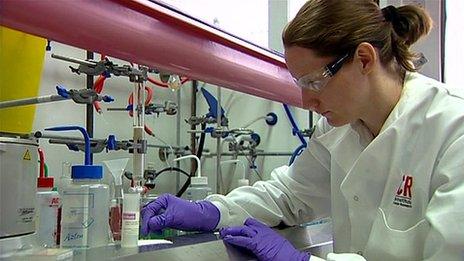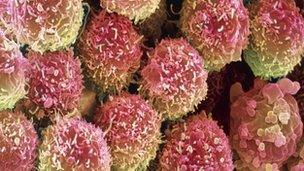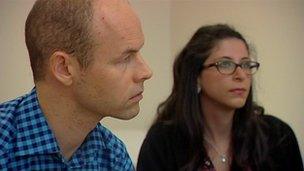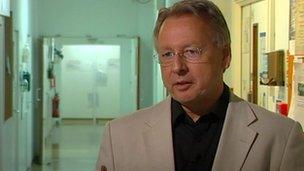Pioneering cancer treatment's struggle for survival
- Published

Immunotherapy aims to use the body's immune system against tumours, but a struggle to find funding might hamper this cutting edge research.
Most of us know someone who has had to cope with a diagnosis of cancer, with the treatment, and then with the worry that it might return.
In recent years, treatments have made real improvements, but often it is still a matter of prolonging life by just a few months.
Now, at last, some scientists are daring to hope that one approach might lead us to our best hope of a cure.

Traditionally cancers are treated with surgery, chemotherapy and radiotherapy
In the last two years, attention has turned to a form of cancer treatment called immunotherapy. This aims to turn the power of our own immune systems against tumours.
Until recently, immunotherapy has been a poor relation to more traditional approaches, such as chemotherapy and radiotherapy.
Results in the last couple of years have excited cancer specialists. But the timing could hardly be worse.
Positive results have begun to come in just as the world's financial systems started to wobble, and the usual sources of money have become less easy to find.
Venture capitalists, charities and governments not only have less money to spend, but they are less prepared to spend it on "risky" bets - including unproven cancer therapies.
In the US last year, a team at the University of Pennsylvania reported a major breakthrough for immunotherapy - dramatic improvement in three leukaemia patients. Two appeared to be cancer-free a year after treatment.
Attacking army
Results in the UK have been similarly dramatic.
Newsnight has had exclusive access to a groundbreaking immunotherapy trial, in Manchester.

Ben Perdriau is the third person in the UK to have his cancer treated using killer T cells
The trial, led by Professor Robert Hawkins at the Christie Hospital, is at the cutting edge of work on one part of the immune system - so-called killer T cells that can attack and kill cancer cells.
These killer T-cells are in the body's frontline of immune defences.
Scientists have already found that they can stimulate their production using drugs, but the approach under trial at the Christie involves taking killer T-cells from a patient's own tumour, and growing these up to form a colony of millions in the laboratory.
The idea is to create an attacking army of killer T-cells to safely re-inject into the patient.
Ben Perdriau, and his wife Joanne, flew from Australia to take part in the trial.
He was diagnosed with melanoma in 2010.
Last year he found it had spread to his brain, and now his body has developed resistance to conventional drugs. He is only the third person to try this pioneering new treatment here in the UK.
"The goal is to look to something with a more promising and durable response and complete response that can last for several years, if not indefinitely," said Mr Perdriau.
"So the therapy that's being developed and being administered is something that does hold that promise. So that's why I'm here, putting my hand up for it," he added.
The treatment matters so much for him because his tumour has developed resistance to the best that chemotherapy can offer.
The operation to remove a part of his melanoma went well.
The team found relatively few killer T-cells in Ben's sample, but these grew well in the lab, and will be ready to re-inject into Ben in early August.
Prof Hawkins says that whilst nothing is certain, the treatment does have a 50/50 chance of working.
<bold>Funding hurdles</bold>
Head of London's Institute of Cancer Research, Prof Paul Workman explained that although there was a great deal to be excited about in the latest cancer research, getting it out of the laboratory was still difficult.

Prof Workman feels more needs to be done to ensure the UK remains at the forefront of research
Scientists at his institute recently published exciting work on one form of immunotherapy, making use of a virus that can hitch a ride on red blood cells, so that it travels straight to a tumour, kills the cancer cells, and also triggers the immune system to attack - a bit like a vaccine.
The problem is, not only is it increasingly hard to find money to pay for such research, but also to find the money and the partners to make sure it gets out in to small and large scale trials in patients, and beyond into the commercial world as treatments.
"Right now we've got a combination of the most exciting science and the most frustrating financial situation," said Prof Workman.
"We've got the cancer genome, we've got immune approaches. We've got incredible science and incredible ideas and we can't fund it. So we have to come up with creative approaches," he added.
He said there needed to be a partnership between industry, government and non-profit organisations - charities and philanthropy to bridge the "'valley of death between excellent basic science and pharmaceutical development."
Prof Workman thinks while "good efforts" are being made by the government, funding basic science, universities and research institutes as well as making it easier for the biotech industry to operate would help ensure the UK stays at the cutting edge. "I think more can be done," he added.
Britain's largest cancer charity has found it so hard to secure money and partners that it has set up its own cancer investment fund.
Cancer Research UK's commercial arm is spending £25m, with equal funding from Europe, on this new investment strategy.
One of the major problems facing cancer treatment today is that patients develop resistance to even the best in cancer drugs.
They need a new weapon, and many scientists believe that harnessing the power of our immune systems is their best hope.
Watch Susan Watts' report on the promise of immunotherapy in cancer, and the funding "crunch", on <link> <caption>Newsnight</caption> <altText>Newsnight</altText> <url href="http://www.bbc.co.uk/programmes/b006mk25" platform="highweb"/> </link> tonight at 10.30pm on BBC Two. Or afterwards on BBC iPlayer or the Newsnight website.
- Published17 July 2012